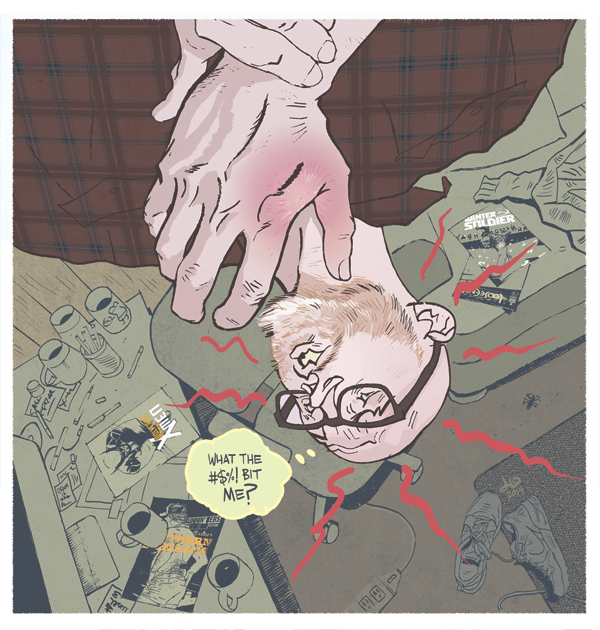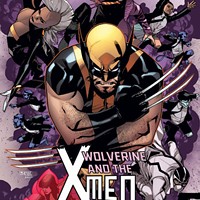One of the coolest things about shopping at Heroes Aren't Hard to Find — the acclaimed Elizabeth-area comic book store — is that you'll often find yourself buying comics side by side with the folks who create them.
Charlotte is, after all, a well-known comic book town, and Heroes (organizers of the annual HeroesCon, coming our way June 20-22) is a mecca for the city's comic culture. So it's only natural that on any given Wednesday, aka "new comic book day," you'll rub elbows with one or more of your favorite pencilers, inkers, colorists, etc.
That's how I first met writer/artist Jason Latour.
I don't remember the exact day we were introduced, but I surmise it was at some point in 2011 — about the time when Loose Ends, the critically lauded crime/romance comic he created and wrote (with artist Chris Brunner providing the pictures and Rico Renzi supplying the colors), first hit the stands.
Humble, mellow and incredibly low-key, yet super-personable — and sporting the bald-head-and-goatee look that so many comic pros seem to love — Latour and I would regularly shoot the shit about story lines on specific books, sales figures, his search for new gigs and how, if he got the chance, he would write certain characters. (I distinctly remember more than one convo about his kick-ass take on the Black Panther.)
Around that time, comic readers were beginning to get hip to his approach to writing (a sparse, dialogue-light style that lets the pictures on the page speak louder than word balloons, in stories populated by flawed, complex figures) and drawing (economical, utilizing a minimal amount of lines, but tons of emotion and a cinematic approach to "camera" angles). But, back then, the big-name editors at the industry's top publishing houses had yet to catch on to his abilities.
These days, however, while he's still the same laid-back guy, Latour, a Charlotte native, has graduated to the upper echelons of the comic food chain; utilizing both barrels of his artistic arsenal, he's now the creative force on two major league assignments.
Currently, you can check out Latour's writing chops by opening up an issue of the monthly series Wolverine and the X-Men, which re-launched in March and (as the title suggests) stars some of pop culture's most recognizable heroes. Oh, and it's published by industry giant Marvel Comics; yes, the same Marvel Comics whose catalog of characters (The Avengers, Iron Man, Spider-Man, etc.) has been generating billions of dollars at the box office over the last few years. The company's pantheon of X-Men is set to get the big–screen treatment yet again when the latest film in the franchise, X-Men: Days of Future Past, hits theaters May 23.
In addition to his mutant-flavored writing assignment, Latour is also handling art chores on the brand-new title Southern Bastards — a crime comic that's based in (you guessed it) the Deep South. Launched in April, this monthly series is being released by the industry's third-largest publisher, Image Comics. And unlike his gig at Marvel, which is work-for-hire, Latour (along with writer Jason Aaron) co-owns Southern Bastards, so if the comic morphs into a TV show, movie, video game or whatever at some point in the future (which, given Hollywood's current love affair with the comics world, is a very real possibility), he will reap a bigger chunk of the financial rewards.

With his name linked to two high-profile projects, he is undoubtedly at a major point in his career — a place that countless fanboys, as well as fellow comic artists and writers, would give a pinky toe to reach. Latour, however, is characteristically keeping things in perspective.
"You vacillate between feeling really good about yourself and being a little overwhelmed," the 36-year-old says.
So how did Latour find himself in such an enviable position within the ranks of comicdom? It turns out that his ascent came as a result of sheer talent, a hard-core work ethic, a little luck and a brief — but life-altering — run-in with the law.
SECOND COMING
Before he started any of his work in the industry, Latour was a young man fresh out of college without a lot of direction.
Although he'd always flirted with the idea of working as an artist, he was raised in a blue-collar family, where the ethic "go to school, get good grades, graduate and get a job with benefits" didn't mesh with the impractical notion of following a not-so-steady creative career path. So, after graduating from Eastern Carolina University in 1999 with a degree in journalism/PR, he came back to Charlotte and drove a truck, delivering materials to work sites for his father, an electrical contractor.
"I was really unhappy with that job," says Latour. "Even though, at the end of the day, I felt good about myself for working hard, I just kind of felt I was wasting my brain."
He worked for his dad for about a year before moving to Atlanta for a position with an advertising company. But he quickly discovered that there wasn't a ton of work to go around. He found himself sitting at his cubicle, twiddling his thumbs more often than not. Still, although he wasn't thrilled with the job, for the first time, he was making decent, steady money. "It was just enough money to keep me in 'jail,'" he says. "I wasn't happy, but I couldn't really turn away from the things I was told would give you a great life."
Bored with the new job, Latour started drinking away all his new disposable income every weekend. Then, right around the time the George W. Bush was first elected in the early 2000s, he was laid off from his fairly new advertising job. The layoff sent him deeper down a spiral of "self-sabotage," he says, Everything came to a head one night — while hanging out and driving around his old college town, he was pulled over by local police and slapped with a DUI.
After that, Latour says, his life — unfulfilling as it was at the time — really started to unravel: "It was so bad ... I got my license taken away for two years. I had to give up my apartment, didn't have a job and had to move back in with my folks."
Without employment, a home of his own or transportation, all he had was time on his hands — time he used to focus on the one thing he'd left on the back burner for too long: his dream of being an artist.
"Living at home and not being able to drive really gave me the time to grow the fuck up a bit and finally see that this was something I wanted to do," he says. "The DUI was just a start. After that, I hadn't figured it out all the way, but I took the first step toward trying to develop the habits I would need to work for myself and invest in my own art."

- Self-portrait illustrated by Jason Latour
HERE COMES TOMORROW
Latour's comic book career officially kicked off in 2004 when he worked as an artist on the short-lived espionage series The Expatriate. Published by Image and written by B. Clay Moore, it's a comic that Latour admits he wasn't exactly ready for: "I couldn't meet the demands of penciling, inking and coloring a book. I just couldn't do it at the time."
After The Expatriate, he picked up several small jobs at various publishers over the years until — along with the previously mentioned Brunner and Renzi (who says he first met Latour "probably on some comic art message board or something" before connecting in person one year at HeroesCon) — he decided to be more proactive about his comic work and co-created the crime-themed comic Loose Ends, published by 12-Gauge Comics in 2011.
Says Renzi about the birth and success of Loose Ends: "We, Chris Brunner and I, had known Jason for a long time and wanted to work on something together forever, but other jobs always got in the way and kept us too busy to do so. I believe Jason had two or three ideas he had been asking us to choose from, and we saw the most potential for the type of thing we wanted to do in Loose Ends. Dark crime done artfully is extremely popular right now, so that might have something to do with the appeal. Jason's well-crafted story along with Chris' drawing is pretty enthralling too."
That book quickly garnered Latour major-league attention, leading to jobs at DC, Dark Horse Comics and ultimately Marvel, where he was hired to write a few issues of The Winter Soldier (who's appearing in cinemas now via the latest Captain America movie).
"I was offered Winter Soldier by [an editor] who just happened to like Loose Ends. I never saw it coming," he says, regarding the serendipitous nature of landing gigs. "I hear people talk about building brands ... but the only brand that I have is the stuff I wanna do."
Fast-forward to today and you can catch him working on comics full-time, clocking in 16-hours days at the drawing table and in front of the laptop in his Charlotte home. He stays motivated and driven, fueled by the oft-used cliché: You're only as good as your last job. But leave it to Latour to keep things in perspective.
"I don't think your average person understands how much work goes into [making comic books]" he says. "But that said, you work your whole life to be ready for it. ... [Creating] cartoons is not easy, but it's not breaking your back digging ditches either. My job's a lot of fun, and I do love it. I'm a lucky dude."

